The 2024 Tacoma shakes up the mid-size truck segment by offering two body styles, two bed lengths, and a 326 hp hybrid engine
3 hours ago
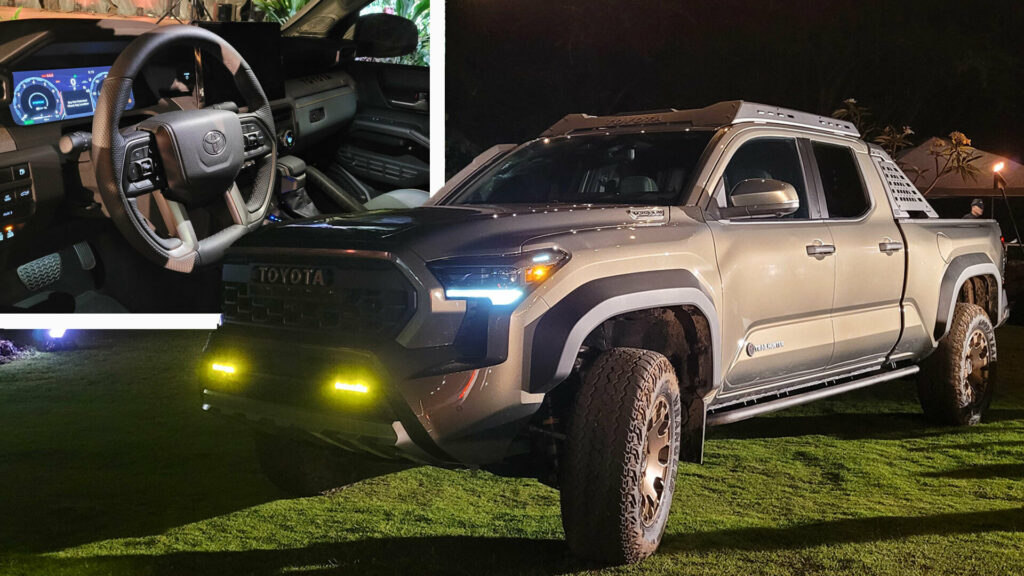
The mid-size truck segment is booming thanks to new entries from Ford, General Motors, and Toyota. As a result, if you’re in the market for a new pickup, your timing couldn’t be better.
That’s certainly true as the Chevrolet Colorado impressed us during our first drive, while the Jeep Gladiator is undeniably cool thanks to its rugged looks and removable roof. Last month, we also checked out the 2024 Ford Ranger and Toyota Tacoma. We’re focusing on the latter today and it’s undoubtedly the truck to beat.
Toyota Threw Everything At The Wall And Most Of It Sticks
Pictures: Michael Gauthier/CarScoops
While the latest crop of mid-size trucks was designed with pesky things like profitability in mind, Toyota seems to have taken a ‘sure, why not?’ attitude. You want 5’ and 6’ beds? Sure, why not? You want a two-door XtraCab (Extended Cab) that doesn’t have rear jump seats or easily accessible storage? Sure, it doesn’t make much sense but, why not? You want a manual that will appeal to like 5% of buyers? Sure, why not?
We could go on and on, but you get the idea as Toyota threw everything at the wall to see what sticks. It’s ridiculous and awesome, and that’s even before mentioning the 2024 Tacoma offers no less than eight different trims. That’s overkill by any stretch of the imagination, but it brought us the all-new Trailhunter.
It’s undoubtedly the coolest trim and Toyota bills the Tacoma Trailhunter as a purpose-built overlanding rig that you can buy right off dealer lots. Officials added Toyota is the “de facto choice” of the overlanding community, so it makes sense to offer an overlanding truck straight from the factory.
advertisement scroll to continue
More: 2024 Toyota Tacoma Trailhunter And TRD Pro Debut With 33-Inch Tires And 326 Hybrid Ponies
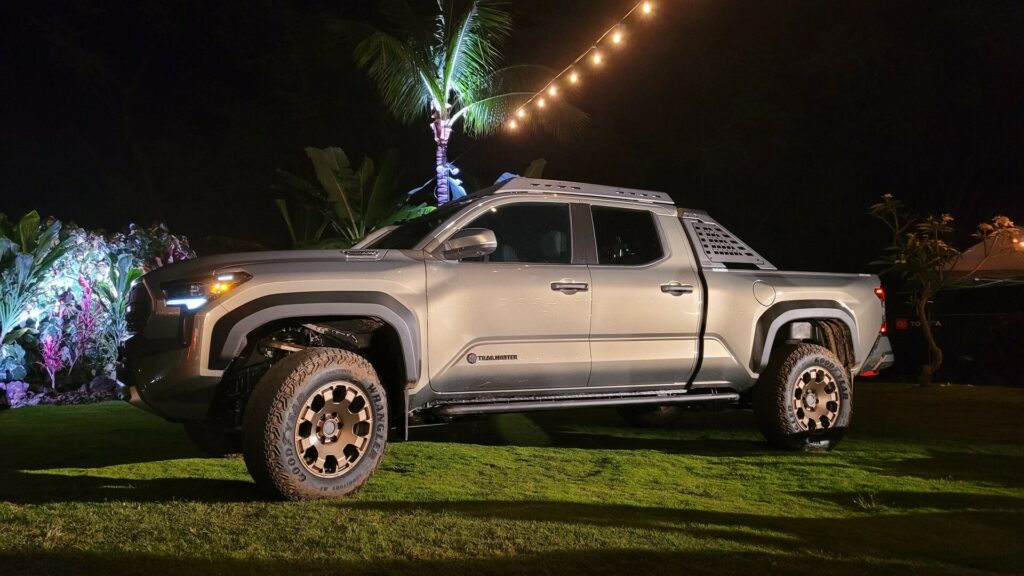
Thankfully, the company recognized they could make the truck better by working with the aftermarket so they teamed up with ARB. This collaboration pays big dividends as it spawned a rugged pickup that is warrantied and has off-road focused equipment that doesn’t interfere with driver assistance systems.
The results speak for themselves as the Trailhunter looks great and features a muscular front end with a heritage-inspired grille that boasts an integrated light bar as well as bronze “TOYOTA” lettering. That’s just the tip of the iceberg as the truck has a raised air intake and LED fog lights, which can switch between yellow and white.
Moving further back, designers installed extended fender flares, rock rails, and a bed utility bar with removable MOLLE panels. The latter are a unique addition, but they’re not the only notable upgrade as the truck rides on 18-inch bronze wheels that are wrapped in 33-inch Goodyear Territory R/T tires.
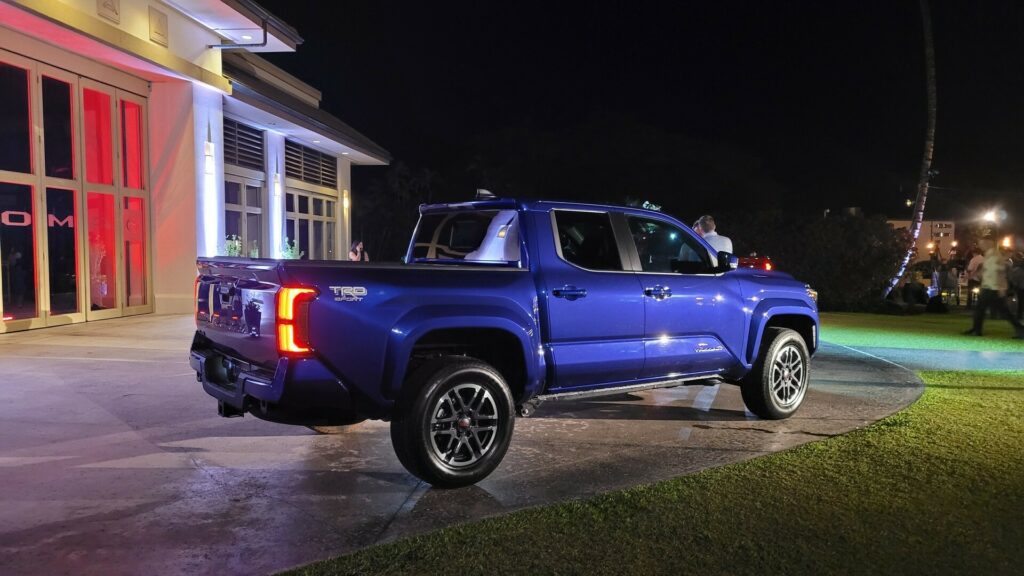
Rounding out the highlights are an ARB steel bumper, a high-clearance exhaust system, red recovery points, and lights that surround the bed and can be used when overlanding. Buyers will also find skid plates, an integrated air compressor, and an Old Man Emu suspension that lifts the truck 2 inches (51 mm) at the front and 1.5 inches (38 mm) at the rear.
Unfortunately, ‘regular’ models have an air dam that goes on for days. It’s huge and hideous, but designers said ‘sure, why not?’ while presumably cursing out the executives who decided to ruin their truck by grafting a Tupperware container onto it.
This was done in the name of fuel efficiency and aerodynamics, but it looks awful. Officials suggested it’s relatively easy to remove, but that feels like a copout and it means there will be a lot of ugly trucks rolling around.
At the opposite end, there’s a lightweight aluminum tailgate with an available power open and close function which can be operated by buttons integrated into each taillight. This is a nice feature, especially for a mid-size truck, as it enables owners to easily lower the tailgate when they’ve got something in their hands.
Other highlights include a small sliding rear window and available AC power in the bed. The Tacoma also eschews a corner step rear bumper, but the company offers a retractable step instead.
A Tundra-Like Cabin With Plenty Of Tech
Pictures: Michael Gauthier/CarScoops
While the exterior looks great aside from the dam, the interior is where the Tacoma really shines as it has one of the nicest cabins in its class. Design and material quality far outpaces the Ford Ranger, and the cabin feels relatively classy for a mid-size truck.
This shouldn’t be too surprising as the interior is heavily inspired by the larger Tundra. That’s especially true in higher-end variants, which have a 12.3-inch digital instrument cluster and a 14-inch Toyota Audio Multimedia system just like their full-size counterpart. However, even the base model comes with a 7-inch display and an 8-inch infotainment system.
Speaking of equipment, the Tacoma can be outfitted with heated and ventilated front seats, a digital rearview mirror, and a moonroof. The most interesting feature though is a JBL audio system with a portable speaker. The latter resides on top of the dash and can be removed to bring the party outdoors. When separated from the vehicle, it operates as a Bluetooth speaker that can provide up to six hours of playback.
More: 2024 Toyota Tacoma Is The Swiss Army Knife Of Pickups As It Offers Hybrid Power, Manual And 6′ Bed
We’ll learn more details closer to launch, but the truck makes a good first impression as it features spacious and heavily bolstered front seats. They should keep you in place while off-roading, but the seats felt a little on the firm side.
Like most other mid-size trucks, rear legroom is limited but acceptable for adults. However, the TRD Pro’s IsoDynamic Performance seats seem to eat up some valuable second-row knee room and that’s disappointing to say the least.
Headroom is also in short supply, but the ceiling is sculpted to make the best of the situation. However, things might be better in trucks that eschew a moonroof.
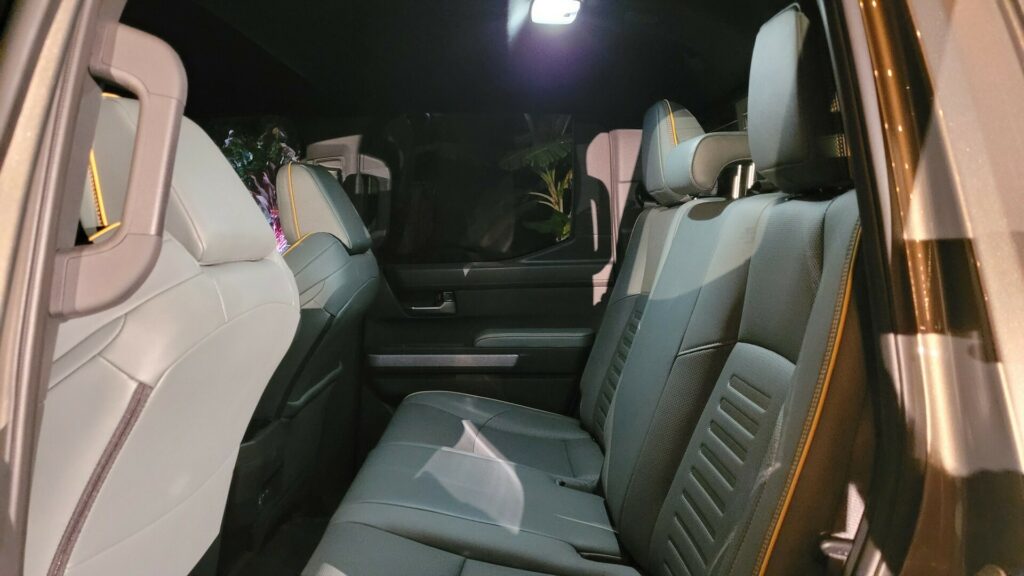
While passenger space is limited, there’s three times more storage space beneath the rear seats. The rear seatback also folds down to aid in hauling large and bulky items.
As for the rest of the cabin, it has an intuitive design with tons of physical switchgear. They’re joined by padded surfaces and rubberized grips that thankfully feel good. However, some of the plastics are so-so and the MOLLE panels on the center console and doors don’t seem particularly special. On the bright side, there’s a decent amount of storage space including a ‘hidden’ compartment on the driver’s side.
It’s also impossible not to mention the “Toyota” or “Tacoma” badging on the passenger side dashboard. The bold lettering is a bit much and it’s about as cool as having your name Sharpied in your underwear.
An All-New Turbo Engine And Available Hybrid Power
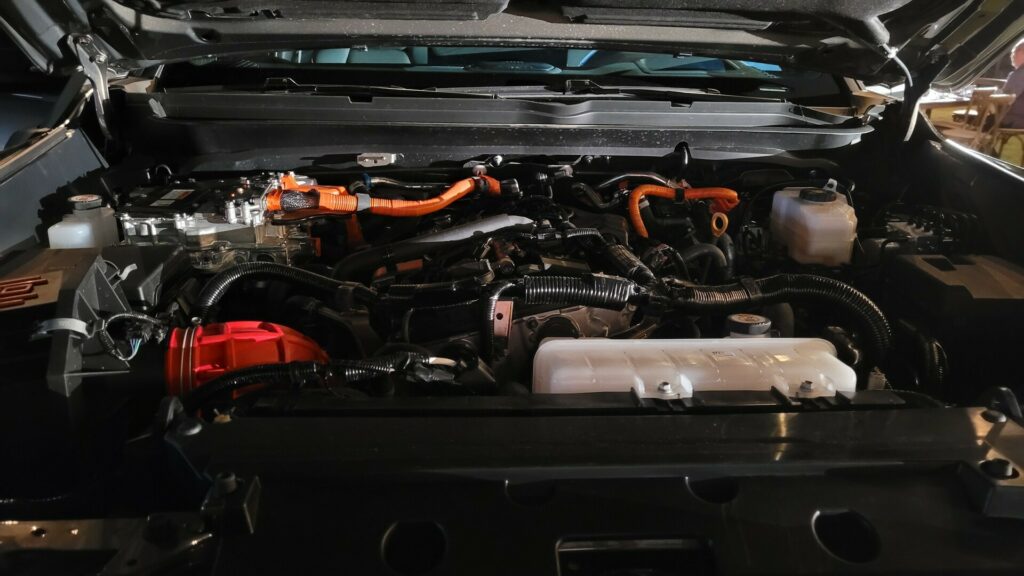
While you can read more about the truck’s engine lineup and capabilities in our original piece, we’ll do a brief recap here and mention the model comes standard with an all-new turbocharged 2.4-liter four-cylinder. It produces 228 hp (170 kW / 231 PS) and 243 lb-ft (329 Nm) of torque in the fleet-focused Tacoma SR.
That’s a huge improvement over the old 2.7-liter four-cylinder, which made a laughable 159 hp (119 kW / 161 PS) and 180 lb-ft (244 Nm) of torque. Nevertheless, the new engine falls short of the Colorado’s entry-level output of 237 hp (177 kW / 240 PS) and 259 lb-ft (351 Nm).
The mid-level 2.4-liter i-Force turbo will power most trucks and it produces 278 hp (207 kW / 282 PS) and 317 lb-ft (429 Nm) of torque when paired to an eight-speed automatic transmission. A six-speed manual will also be available, although it comes with a reduced output of 270 hp (201 kW / 274 PS) and 310 lb-ft (420 Nm).
The latter numbers are identical to the Ranger’s 2.3-liter EcoBoost four-cylinder, which also develops 270 hp (201 kW / 274 PS) and 310 lb-ft (420 Nm) of torque. However, that truck is only available with a ten-speed automatic transmission.
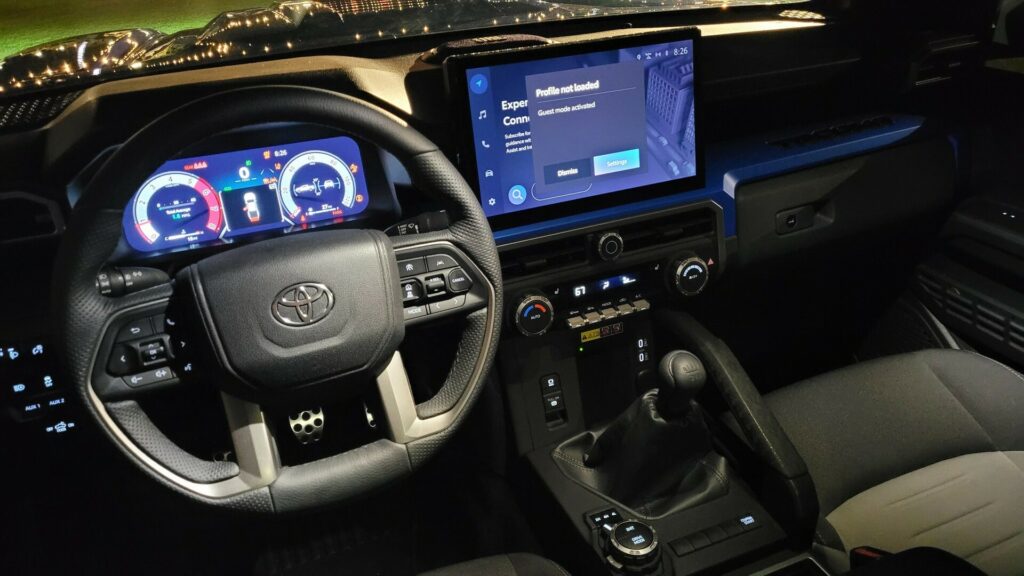
Elsewhere in truck land, the Colorado’s mid-level 2.7-liter four-cylinder develops 310 hp (231 kW / 314 PS) and 390 lb-ft (528 Nm) of torque, while the Gladiator’s 3.6-liter V6 produces 285 hp (209 kW / 289 PS) and 260 lb-ft (353 Nm) of torque. Likewise, the Frontier’s 3.8-liter V6 has 310 hp (231 kW / 314 PS) and 281 lb-ft (381 Nm) of torque.
While the mid-level engine trails a number of competitors, Toyota has an ace up its sleeve in the form of the all-new i-Force Max powertrain. It consists of a turbocharged 2.4-liter four-cylinder engine, a 1.87 kWh nickel-metal hydride battery, and an electric motor that is integrated into the eight-speed automatic transmission. This enables the truck to produce 326 hp (243 kW / 331 PS) and 465 lb-ft (630 Nm) of torque.
This outguns a number of rivals including the Ranger’s new 2.7-liter EcoBoost V6, which has 315 hp (235 kW / 319 PS) and 400 lb-ft (542 Nm) of torque. On the other hand, it falls short of the Ranger Raptor’s 3.0-liter EcoBoost V6 which boasts a class-leading 405 hp (302 kW / 411 PS) and 430 lb-ft (582 Nm) of torque.
Toyota Looks Like It Has A Winner On Its Hands
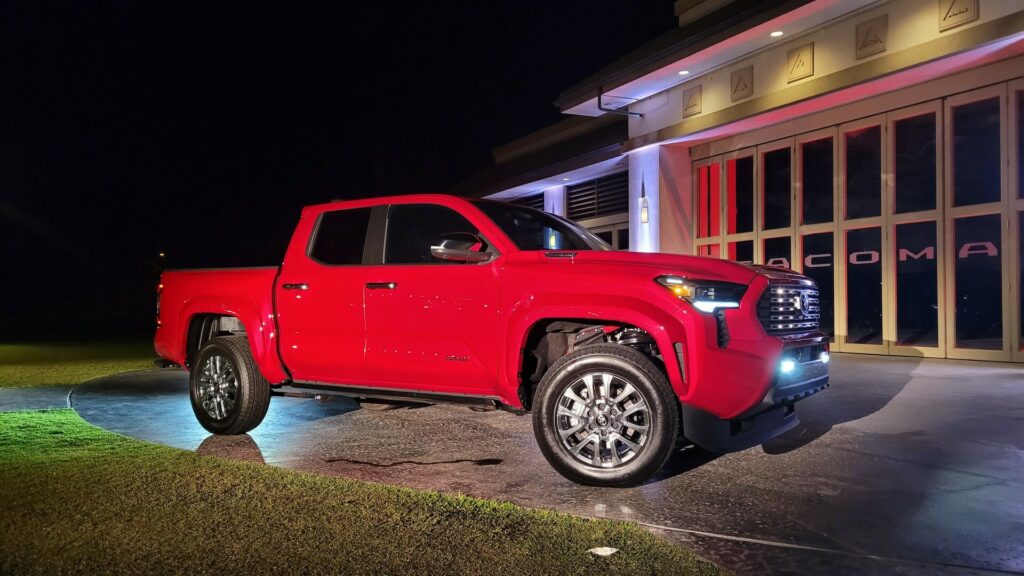
We’ll get a better idea of how the Tacoma stacks up when we drive it later this year, but it makes a good first impression and we’re eager to see how much the new multi-link coil suspension has improved the ride quality.
That being said, Toyota appears to have a winner on its hands. Only time will tell, but the Tacoma combines good looks with a classy cabin, tons of options, and the only hybrid powertrain in its class.
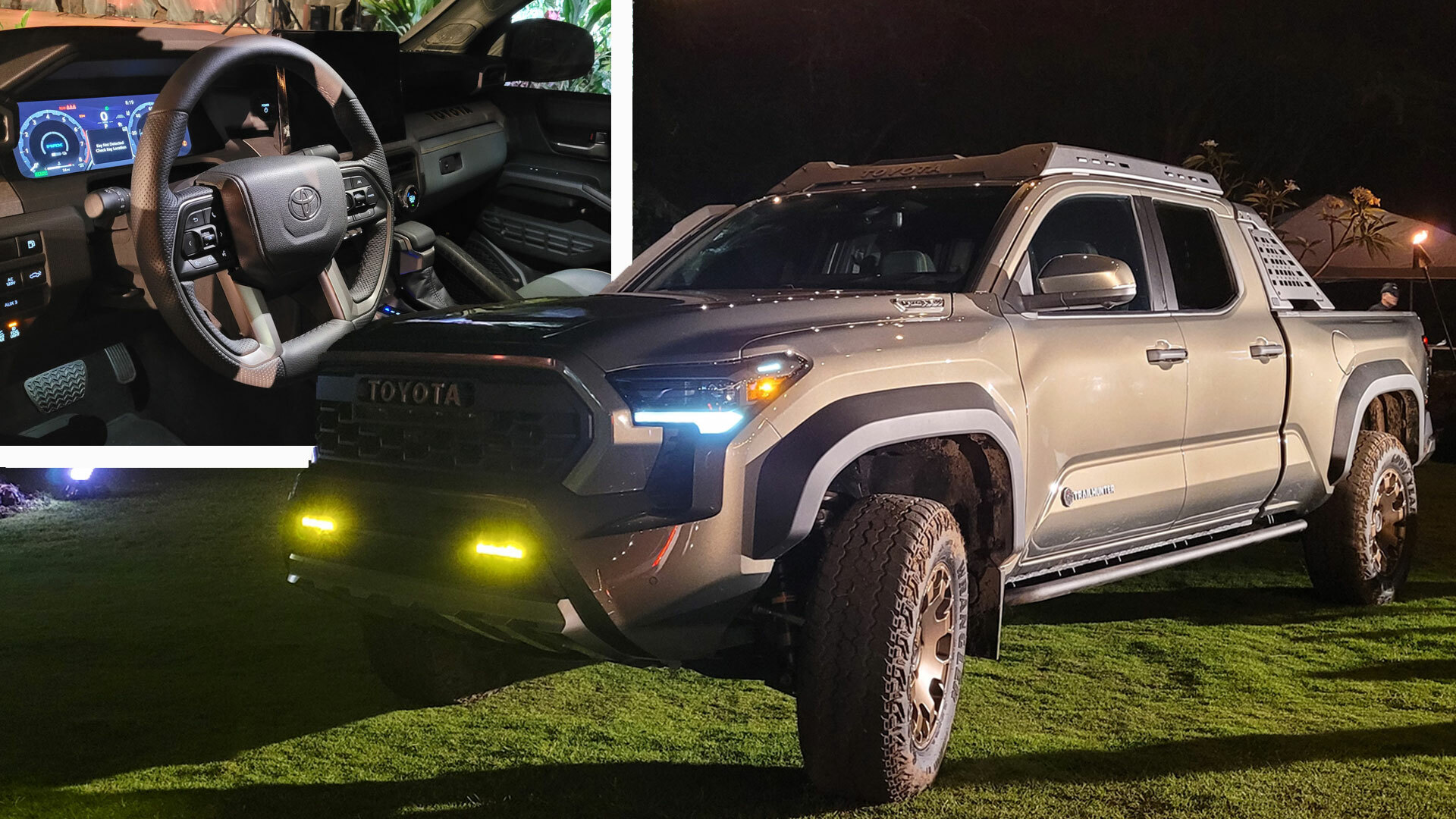
side effects of ivermectin – ivermectin 12 mg for people buy carbamazepine 400mg for sale
order accutane 10mg pills – linezolid ca linezolid 600 mg tablet
amoxicillin tablets – diovan uk order combivent 100 mcg pills
purchase omnacortil without prescription – azipro over the counter progesterone 100mg drug
brand clavulanate – order generic nizoral 200 mg buy duloxetine 20mg online
buy vibra-tabs for sale – order generic vibra-tabs glipizide oral
purchase semaglutide pill – buy generic semaglutide buy cyproheptadine
tizanidine 2mg over the counter – buy zanaflex generic buy microzide 25 mg for sale
order tadalafil sale – tadalafil online buy sildenafil without prescription
sildenafil 100mg pill – sildenafil pills 25mg order cialis 5mg online cheap
atorvastatin 20mg oral – buy lipitor paypal buy zestril 10mg sale
cenforce over the counter – how to get aralen without a prescription buy glucophage pills